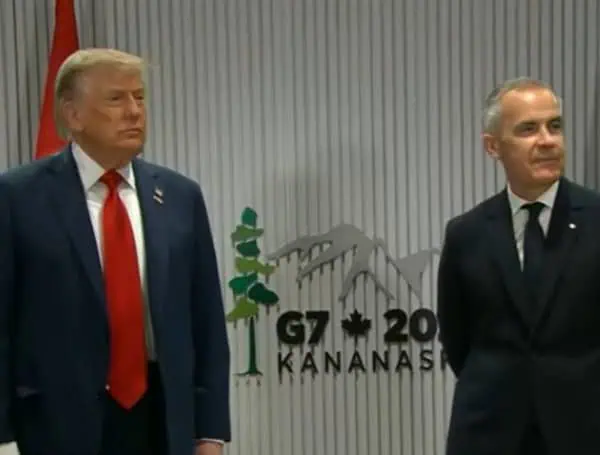U.S. President Donald Trump and Canadian Prime Minister Mark Carney met today at the G7 Summit, acknowledging differing approaches to trade relations between their two nations. While both leaders expressed hope for a swift agreement, Trump reiterated his preference for tariffs, contrasting it with Carney’s “more complex idea.”
During a brief news conference largely led by President Trump, he stated, “I have a tariff concept, Mark has a different concept… we’re going to see if we can get to the bottom of it today.” Trump emphasized his long-held belief in tariffs as a “simple, easy, precise” method for trade.
READ: Federal Judge Extends Block On Trump Admin’s Targeting Of Harvard International Students
He expressed confidence that a deal was “achievable” quickly, though no specific timeline was given.
The meeting takes place amid heightened trade tensions. Earlier this year, President Trump imposed 25% tariffs on goods from Canada and Mexico, citing concerns over fentanyl and migrant crossings, later applying these tariffs to goods outside the United States-Mexico-Canada Agreement (USMCA).
Additional tariffs include a 10% levy on non-USMCA compliant potash and energy products from Canada, and a 50% tariff on aluminum and steel imports from all countries, in effect since June 4. A 25% tariff also applies to all cars and trucks not built in the U.S.
READ: Blumenthal, Graham Tag-Team Trump: Sanction Russia Now, Cripple Iran’s Nuclear Ambitions
These tariffs have drawn frustration from Canadian leaders and residents. President Trump has also repeatedly suggested that Canada become the 51st U.S. state, having previously referred to former Canadian Prime Minister Justin Trudeau as “governor.”
Economists and businesses have warned that tariffs could lead to higher consumer prices. Trump, however, maintains that tariffs are a tool to restore manufacturing jobs, shift the tax burden from U.S. families, and reduce national debt. A tariff is defined as a tax on imported goods paid by the importer, who may then pass the cost on to consumers.
Please make a small donation to the Tampa Free Press to help sustain independent journalism. Your contribution enables us to continue delivering high-quality, local, and national news coverage.
Connect with us: Follow the Tampa Free Press on Facebook and Twitter for breaking news and updates.
Sign up: Subscribe to our free newsletter for a curated selection of top stories delivered straight to your inbox.
